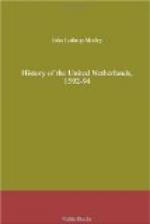But it was impossible, as already intimated, for Mayenne to work harmoniously with his nephew. The Duke of Guise might marry with the infanta and thus become King of France by the grace of God and Philip. To such a consummation in the case of his uncle there stood, as we know, an insuperable obstacle in the shape of the Duchess of Mayenne. Should it come to this at last, it was certain that the Duke would make any and every combination to frustrate such a scheme. Meantime he kept his own counsel, worked amiably with Philip, Parma, and the young duke, and received money in overflowing measure, and poured into his bosom from that Spanish monarch whose veterans in the Netherlands were maddened by starvation into mutiny.
Philip’s plans were a series of alternatives. France he regarded as the property of his family. Of that there could be no doubt at all. He meant to put the crown upon his own head, unless the difficulties in the way should prove absolutely insuperable. In that case he claimed France and all its inhabitants as the property of his daughter. The Salic law was simply a pleasantry, a bit of foolish pedantry, an absurdity. If Clara Isabella, as daughter of Isabella of France, as grandchild of Henry II., were not manifestly the owner of France—queen-proprietary, as the Spanish doctors called it—then there was no such thing, so he thought, as inheritance of castle, farm-house, or hovel—no such thing as property anywhere in the world. If the heiress of the Valois could not take that kingdom as her private estate, what security could there ever be for any possessions public or private?
This was logical reasoning enough for kings and their counsellors. There was much that might be said, however, in regard to special laws. There was no doubt that great countries, with all their livestock—human or otherwise—belonged to an individual, but it was not always so clear who that individual was. This doubt gave much work and comfortable fees to the lawyers. There was much learned lore concerning statutes of descent, cutting off of entails, actions for ejectment, difficulties of enforcing processes, and the like, to occupy the attention of diplomatists, politicians and other sages. It would have caused general hilarity, however, could it have been suggested that the live-stock had art or part in the matter; that sheep, swine, or men could claim a choice of their shepherds and butchers.
Philip—humbly satisfied, as he always expressed himself, so long as the purity of the Roman dogmas and the supremacy of the Romish Church over the whole earth were maintained—affected a comparative indifference as to whether he should put the crown of St. Louis and of Hugh Capet upon his own grey head or whether he should govern France through his daughter and her husband. Happy the man who might exchange the symbols of mutual affection with Philip’s daughter.




